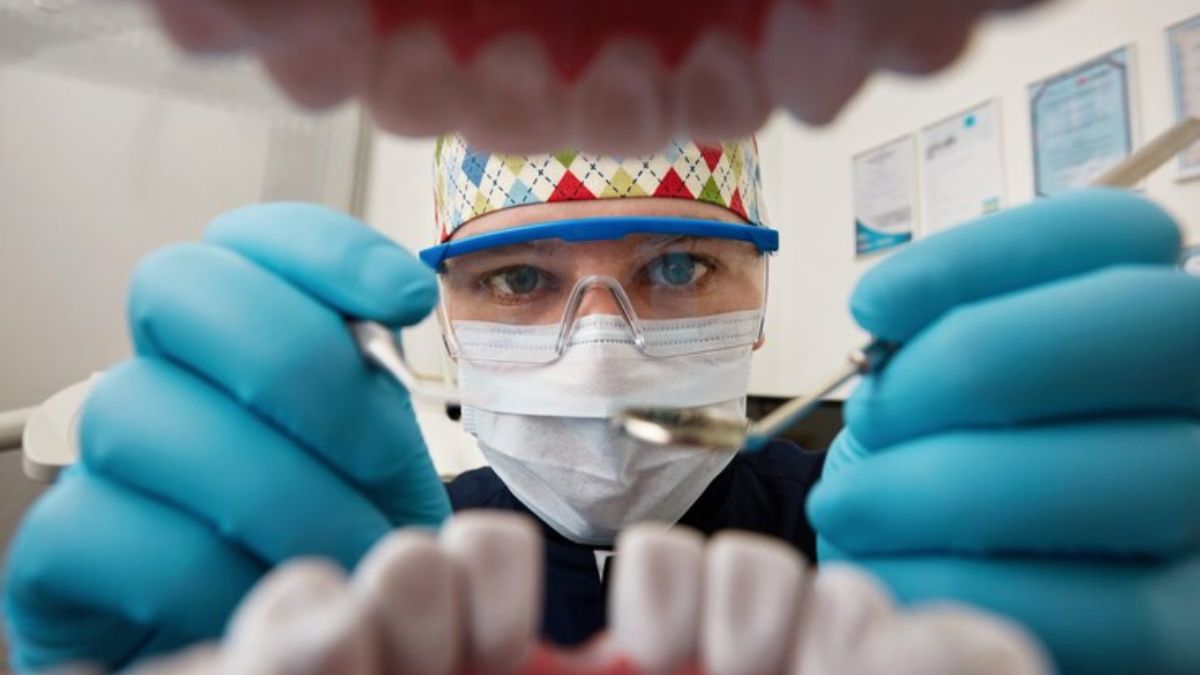HEALTH
Unlocking the Future of Dentistry: The Ultimate Guide to Dental Implant Courses

Imagine a world where dental professionals can restore smiles with the precision and artistry of a master craftsman. This is not just a dream; it’s becoming reality through the innovative field of dental implants. As more patients seek solutions for missing teeth, the demand for skilled practitioners in this area is skyrocketing. Enter dental implant courses—specialized training programs designed to equip dentists with cutting-edge techniques and knowledge.
Whether you’re an established dentist looking to expand your skill set or a fresh graduate eager to dive into advanced practices, these courses could be your gateway to transforming lives one smile at a time. With numerous options available, navigating this landscape may seem daunting, but fear not! We’re here to guide you through everything you need to know about dental implant courses and how they can unlock exciting new opportunities in your career. Ready? Let’s dive in!
What are Dental Implant Courses?
Dental implant courses are specialized training programs designed for dental professionals seeking to enhance their expertise in implantology. These courses cover the essential principles of placing and restoring dental implants, providing both theoretical knowledge and practical skills.
Participants learn about various types of implants, surgical techniques, and the latest advancements in materials used. The curriculum often includes hands-on workshops where attendees can practice on models or live patients under expert supervision.
These courses cater to dentists at different stages of their careers—from recent graduates eager to gain foundational skills to experienced practitioners looking to refine advanced techniques. With a mix of lectures, interactive sessions, and clinical practice, dental implant courses offer a comprehensive learning experience tailored to individual needs.
The Benefits of Dental Implant Courses
Dental implant courses offer a plethora of advantages for dental professionals looking to elevate their skills. They provide comprehensive training in the latest techniques and technologies, ensuring practitioners stay current in a rapidly evolving field.
These courses enhance confidence when performing complex procedures. Participants gain hands-on experience, which is crucial for mastering intricate aspects of dental implants.
Networking opportunities also abound within these programs. Connecting with peers and industry leaders can open doors to collaborations or mentorships that further enrich one’s career.
Moreover, completing specialized training often leads to increased patient trust. When clients see that their dentist has advanced qualifications in implants, they are more likely to choose your practice over others.
Offering dental implant services can significantly boost practice profitability. With rising demand for implants, being skilled means tapping into a lucrative market while improving patients’ quality of life through better oral health solutions.
Types of Dental Implant Courses
Dental implant courses come in various formats, each tailored to different learning preferences and professional needs.
One popular option is the hands-on workshop. These immersive experiences allow participants to practice techniques on models or even live patients under expert supervision.
Another type includes online courses, which offer flexibility for busy professionals. Participants can learn at their own pace while accessing a wealth of resources from anywhere.
Some programs focus specifically on advanced topics, such as bone grafting or digital implant planning. These specialized courses cater to those looking to enhance their existing skills.
For those seeking comprehensive training, certificate programs provide a deep dive into all aspects of dental implants. They often combine theoretical knowledge with practical application over several weeks or months.
Each course type presents unique advantages that cater to individual career goals and schedules.
Online vs In-Person Courses
When considering dental implant courses, the format can significantly impact your learning experience. Online courses offer flexibility. You can study at your own pace and access materials anytime, from anywhere.
On the other hand, in-person courses provide hands-on training. This face-to-face interaction with instructors allows for immediate feedback and a more immersive environment. Networking opportunities with peers also enhance the overall learning experience.
Both formats have their merits. Online courses typically come with lower costs and accessibility advantages. In contrast, in-person classes foster practical skills that are crucial for mastering techniques.
Think about your personal preferences and schedule when making this choice. Do you thrive in structured environments or prefer self-directed learning? Your answer may steer you toward one format over the other.
How to Choose the Right Course for You
Choosing the right dental implant course can feel overwhelming, but it doesn’t have to be. Start by assessing your current skill level and experience in dentistry. Understanding where you stand will help pinpoint courses that match your learning needs.
Next, consider the course content. Look for programs offering hands-on training and comprehensive theory. A well-rounded curriculum is essential for mastering implant techniques effectively.
Accreditation is another vital factor. Ensure the course is recognized by relevant professional bodies. This not only enhances your credentials but also ensures quality education.
Don’t forget to check reviews and testimonials from past students. Their experiences can provide insight into what to expect.
Think about flexibility—whether online or in-person—and how it fits with your schedule. Choose a format that allows you to learn at your own pace while balancing other commitments.
Career Opportunities and Growth in the Field of Dental Implants
The field of dental implants is expanding rapidly, creating a wealth of career opportunities for dental professionals. As demand grows for advanced restorative solutions, specialists are increasingly sought after.
Dentists can enhance their practices by incorporating implant services. This not only attracts more patients but also elevates the standard of care they provide. With additional training in dental implant courses, practitioners position themselves as leaders in an evolving market.
Moreover, there are numerous avenues within this specialty—oral surgeons, periodontists, and prosthodontists all find ample prospects. Each role offers unique challenges and rewards.
Those who pursue continuous education will likely witness significant growth in their careers. Staying updated with advancements ensures that skills remain relevant in a competitive landscape. Embracing innovation opens doors to new possibilities while enhancing patient outcomes significantly.
Tips for Success in a Dental Implant Course
Success in a dental implant course requires active participation. Engage with your instructors and peers. Ask questions and share experiences to deepen your understanding.
Stay organized with your study materials. Create a schedule that balances coursework, hands-on practice, and revision. This structured approach will help you manage the workload effectively.
Practice is key in mastering dental implants. Utilize simulation labs whenever possible to hone your skills before working on real patients.
Don’t overlook networking opportunities during the course. Connect with industry professionals who can offer insights or mentorship as you progress in this field.
Maintain an open mindset towards feedback and improvement. Constructive criticism is essential for growth, especially in such a specialized area of dentistry. Embrace it and use it to enhance your learning experience.
The Future of Dentistry and the Role of Dental Implant Courses
The future of dentistry is bright and filled with innovation. As technology advances, dental implant courses will play a pivotal role in shaping the next generation of dental professionals.
These courses are essential for equipping dentists with cutting-edge techniques. Continuous education ensures practitioners stay current with advancements in materials and methods.
Moreover, patient expectations are evolving. Individuals seek not just function but aesthetics and comfort in their dental solutions. Skilled professionals who have undergone specialized training in implants can meet these demands effectively.
As telehealth grows, online modules within these courses offer flexibility to busy practitioners. This accessibility opens doors to more learners, fostering a community dedicated to excellence.
As demographics shift towards an aging population needing oral care solutions, the demand for implant expertise will only increase. Investing time into dental implant courses today prepares tomorrow’s leaders in dentistry.
Conclusion
Dental implant courses are a gateway to an exciting and evolving field in modern dentistry. They not only equip dental professionals with the skills required to perform successful implant procedures but also open doors to numerous career opportunities. Whether you opt for online or in-person learning, the right course can significantly enhance your knowledge and confidence.
As technology advances, the demand for skilled dentists proficient in implants continues to grow. This specialization allows practitioners to meet patient needs effectively while elevating their practice’s success. By choosing a suitable course and committing yourself to continuous improvement, you position yourself as a valuable asset in this competitive landscape.
The future of dentistry undoubtedly hinges on innovative techniques like dental implants. Engaging with these educational programs will prepare you for what lies ahead, ensuring that you remain at the forefront of this dynamic industry. Embrace the journey of lifelong learning; it’s where true growth happens within your profession.
HEALTH
How Psychiatric Urgent Care Differs from Traditional ER Visits for Mental Health

Just as physical health emergencies, mental health crises can also occur at any moment and have to be taken care of as early as possible. But when individuals show up with acute psychiatric symptoms, such as severe anxiety, suicidality, or psychosis, they frequently go to emergency rooms (ERs) that are less than optimally constructed to address their needs.
This article discusses some of the major distinctions between psychiatric emergency care and typical emergency room visits, and how the two settings treat people with psychological distress.

The Environment
In contrast to receiving immediate therapy online, ERs are usually crowded, confusing, and full of patients with various health care emergencies, with some seriously ill patients (with fractured bones) and others (with heart attacks). To a person who is already in a weak mental state, such multi-sensory saturation may result in increased anxiety, confusion, or fearfulness.
Among the most obvious and evident contrasts between psychiatric urgent care centers and regular ERs, the atmosphere should be considered.
Typically, the location of the traditional ERs will have:
- High sound and shining lights
- Waiting rooms that are packed
- Mixture of medical emergencies (e.g., trauma and cardiac incidents)
- Stressful environment (both staff and patients)
In a contrasting manner, a psychiatric urgent care centers provide:
- Noise-free, relaxing, spacious rooms with semi-dim light and pale-colored walls
- Smaller rooms that offer respite where there is sensory overload (especially in the case of semi-private rooms )
- Easy chairs that will make one feel easy and relaxed
These design factors help in the provision of a therapeutic environment that allows de-escalation and stabilization of emotions. It is only this environment that can make serious contributions in the healing process before the actual treatment is given.
The Staff
Traditional ERs and psychiatric emergency care centers look extremely dissimilar in terms of personnel specialization and orientation.
In the conventional ERs, the workforce usually comprises:
- Doctors and nurses who work in emergencies
- General practitioners
- Poor or slow availability of psychiatric consultants
- Experts who practice mainly in physical health crises
The following are the staff members of psychiatric urgent care centers:
- Psychiatric nurse practitioners and psychiatrists
- Medical care, social workers, and therapists
- Crisis counselors for mental health crises
- Employees who perform trauma-informed care and de-escalation practices

Treatment Approach
Another important difference has to do with the care approach to a mental health crisis. In recent years, mental health disorders such as anxiety and bipolar disorder have increased by almost 40%.
A treatment in a classical ER can include:
- Stabilization and monitoring
- Use of medicine to treat the acute manifestation
- Referring to the external psychiatric services is usually done in an uncoordinated manner
- Scant or no treatment
The mental health urgent care centers shall usually provide:
- Full Psychiatric assessment
- On-the-spot therapy (individual, group, or family)
- Crisis management and short-term planning of treatment Short-term planning of treatment
- Psychiatric control of medication within the site itself
- Designing an integrated care plan
Wait Times and Accessibility
Delays to care and waiting lists in terms of patient outcomes can have an enormous impact on mental health emergencies.
In classic ERs, there is a possibility of:
- Wait time, especially when triaged behind physical emergencies
- Overcrowded mental health units with few resources
- Psychiatric services have limited availability of operating time
- Timecare barriers
The mental health ER can provide:
- Reduced wait times emphasized the psychiatric need
- Urgent mental health needs that can be accessed on a walk-in basis
- Evenings and weekends, as well as extended hours
- More time-effective contact with specialist personnel
Follow-Up Care
Continuity of care will be important in terms of delivering long-term stability and recovery following the initial crisis.
ERs tend to give little follow-up to include:
- General discharge prescriptions
- Referrals to community mental health care giver
- No definite form of continuity of care
- Potential loss of patients in the cracks
Psychiatric urgent care centers, such as those from Mindful Care, are preoccupied with:
- Discharge planning in detail
- Referring to continuing treatment and mental treatment
- Access to the community resources and groups of support
- In other instances, brief follow-up treatment or drug counselling
Conclusion
A major innovation in the practice of mental health crises is the psychiatric urgent care centers. Although traditional emergency rooms will always be an important resource to provide treatment to people in life-threatening or co-occurring physical emergencies, it is not always geared appropriately to address psychiatric emergencies fully.
Some of the strengths of psychiatric urgent care are:
- Mental wellness-sustaining environments: Specialist environments
- Specially hired mental healthcare workers within the organization
- Individual and instant treatment for mental health
- Less time and more coverage
- Enhanced continuity of care in the form of coordinated follow-up
Psychiatric urgent care constitutes care between outpatient behavioral therapy and inpatient hospitalization, acting as a middle ground, focuses on patient dignity, expertise, and early intervention. Better outcomes and a more humane mental health care process are the promise of this model to individuals, families, and communities.
HEALTH
Natural Ways to Support Oral Health Through Diet

Why Diet Matters for Oral Health
What you eat doesn’t just impact your weight and energy, it shapes your smile too. Nutrition plays a crucial role in teeth straightening and the health of your gums.
The mouth is the starting point of the digestive system, and it’s often one of the first places where nutritional imbalances show up. Deficiencies can weaken enamel, trigger inflammation, and increase your risk of gum disease. But a nutrient-rich, well-balanced diet does the opposite; it helps your body protect and rebuild.
In this blog, you will come to know about key nutrients that support oral health, foods that help clean your teeth naturally, the surprising impact of food texture on alignment, and how to support your smile while you sleep.
Nutrients That Strengthen Teeth and Gums
Let’s start with the essentials. Your teeth and gums need specific vitamins and minerals to stay strong and healthy, especially if you’re aiming for long-term oral wellness.
- Calcium and Phosphorus
These minerals help build and maintain enamel, the protective outer layer of your teeth. They also strengthen the jawbone, which holds your teeth in place.
Sources: dairy products like milk and yogurt, leafy greens, almonds, tofu, and fish like sardines. - Vitamin D
Even if you get enough calcium, your body won’t absorb it well without vitamin D. This nutrient also plays a role in reducing gum inflammation.
Sources: sunlight exposure, mushrooms, and fatty fish like salmon. - Vitamin C
Vital for gum health, vitamin C supports collagen production and protects against gum inflammation and bleeding.
Sources: citrus fruits, strawberries, bell peppers, broccoli, and kiwi. - Antioxidants
Antioxidants help protect your gums from oxidative stress and reduce the buildup of harmful bacteria.
Sources: green tea, blueberries, cranberries, dark chocolate, and spinach.
The Role of Food Texture in Jaw Development
The strength and alignment of your jaw aren’t genetic. The consistency of your food, especially during childhood, plays a huge role in shaping your facial structure.
Soft and processed foods require minimal chewing. Over time, this can lead to weaker jaw muscles and narrower dental arches. Harder fibrous foods require more effort and promote stronger jaws and better bone density.
Diet plays a significant role in jaw development. A well-aligned jaw supports straight bottom teeth, reducing the chances of dental crowding or orthodontic issues later in life.
In fact, a study published in the National Library of Medicine observed that children who regularly consumed harder, textured foods developed better mandibular control and chewing efficiency, indicating more robust muscle and bone development in the jaw.
Whole foods like raw carrots, celery, apples, sugar-free foods, and whole grain bread not only challenge your teeth, but they also help strengthen the muscles around them and encourage healthy oral posture.
Foods That Naturally Clean the Mouth
Some foods act like natural toothbrushes and mouthwash, helping reduce plaque, freshen breath, and support enamel without the need for chemicals.
- Crunchy fruits and vegetables
Raw apples, carrots, and celery scrub the surface of your teeth and stimulate saliva production, which helps wash away food particles and neutralize acids. - Water-rich foods
Cucumbers, melons, and leafy greens help keep the mouth hydrated and flush bacteria away. The more you chew them, the more saliva your mouth produces, which is your body’s first defense against decay. - What to avoid
Sugar, soda, processed starches, and acidic foods like citrus or vinegar-based snacks can erode enamel over time. Coffee and red wine can also stain teeth and dry out the mouth.
Every bite either helps or harms your oral environment. Choosing fibrous, water-dense foods can make a small but steady difference.
Nighttime Oral Health: Diet and Protection
Your mouth gets through a lot while you sleep. If you clench your jaw, breathe through your mouth, or eat too close to bedtime, your teeth may suffer. Fortunately, good nutrition can solve these problems
- Magnesium-rich foods
Magnesium helps relax muscles and nerves, which may reduce nighttime jaw tension or clenching.
Helpful options: almonds, bananas, avocados, pumpkin seeds, and leafy greens. - Hydration
Dry mouth at night increases the risk of cavities. Drinking water in the evening, especially after your last meal, helps prevent bacteria.
Using a night guard after a healthy evening diet can protect your teeth from grinding and erosion while you sleep. It creates a physical barrier and absorbs pressure from unconscious clenching, keeping your enamel safe and your jaw more relaxed.
While diet plays a supporting role, a night guard is often necessary for those dealing with bruxism or teeth grinding.
Bonus Tips for a Diet-Supported Oral Routine
Even the best diet needs good habits alongside it. Consistency in both food choices and habits is what ultimately makes the difference. These daily tips can enhance your efforts and help your smile last longer.
- Don’t brush right after acidic foods
Acid temporarily softens enamel, and brushing too soon can cause more damage. Wait at least 30 minutes. - Rinse after meals
If brushing isn’t possible after lunch or snacks, rinsing your mouth with water can help reduce food particles and acids. - Chew sugar-free gum
This stimulates saliva and may reduce dry mouth and bad breath. - Try saltwater rinses or oil pulling
While not replacements for brushing, they can be gentle supplements to your oral hygiene, especially if your gums feel sensitive. - Avoid constant snacking
Frequent eating, even of healthy foods, keeps your mouth in a low-level acidic state. Give your mouth breaks between meals.
Wrap Up
Healthy teeth aren’t just about toothpaste and dental visits. They are built every day, meal by meal. What you eat feeds the tissues, bones, and systems that support your smile.
By focusing on nutrient-dense foods, staying hydrated, choosing textures that challenge your jaw, and avoiding sugar overload, you create an oral environment that heals instead of deteriorates.
Whether you’re trying to maintain straight bottom teeth, reduce nighttime grinding with a night guard, or simply feel more confident in your smile, the food you choose matters more than you think.
It’s not about perfection. It’s about making smarter, more intentional choices every day. Because your mouth isn’t separate from your body, it’s the first part of your health journey.
Let it start with what’s on your plate.
HEALTH
Exploring Your Options: Finding the Right Depression Treatment That Works for You

Depression is more than just feeling sad or unmotivated—it’s a serious mental health condition that affects how you think, feel, and function in your daily life. Whether you’re experiencing persistent sadness, loss of interest, fatigue, or hopelessness, it’s important to know that depression treatment is available—and it works. National health organizations such as the national institute and health and human services provide guidelines and resources to support effective depression treatment.
At Syncare Behavioral Health, we understand that no two individuals experience depression the same way. It is important to have depression diagnosed by a primary care doctor or mental health professional, as early assessment can lead to better outcomes. Human services organizations and the mental health services administration offer valuable resources for those seeking help and support. That’s why we offer a range of personalized options to help you regain your balance and move forward.
Understanding Major Depressive Disorder: You’re Not Alone
Millions of people worldwide struggle with depression every year. It can be triggered by life events, trauma, chemical imbalances, or appear without any clear reason. Whether you’re dealing with major depressive disorder, postpartum depression, or seasonal depression, effective treatment for depression is within reach. Major depression is a serious mental disorder that can significantly impact daily life and functioning. Another mood disorder, bipolar disorder, involves both depressive and manic episodes, and requires different diagnostic and treatment approaches.
Common depression symptoms include:
- Ongoing sadness or low mood
- Loss of interest in activities you once enjoyed
- Trouble sleeping or oversleeping
- Difficulty concentrating or making decisions
- Appetite changes or weight fluctuations
- Feelings of guilt, worthlessness, or helplessness
- Thoughts of self-harm or suicide
Depression symptoms can sometimes be caused by or confused with medical conditions, so a thorough evaluation by a healthcare professional is important.
If you recognize any of these symptoms in yourself or someone you love, don’t wait to seek help for depression. Recognizing depression symptoms is a key step in identifying mental disorders and getting the right support.
How Depression is Diagnosed and Assessed
Getting the right help for depression starts with an accurate diagnosis. When you reach out to a mental health professional—such as a psychologist or psychiatrist—they will guide you through a comprehensive evaluation. This process often includes a physical exam, lab tests, and an in-depth conversation about your symptoms, medical history, and mental health background.
To ensure a precise diagnosis, clinicians use the American Psychiatric Association’s Diagnostic and Statistical Manual (DSM-5), which outlines clear criteria for depressive disorders like major depressive disorder and persistent depressive disorder. Typically, a diagnosis is made when symptoms such as a depressed mood or loss of interest in activities persist for at least two weeks and significantly impact your daily life.
An accurate diagnosis is the foundation for developing a personalized treatment plan. This may involve antidepressant medication, psychotherapy, or a combination of both, tailored to your unique needs. By working closely with a mental health professional, you can be confident that your care is based on the latest clinical guidelines and best practices for treating depressive disorders.
What Depression Treatment Looks Like
Depression treatment isn’t one-size-fits-all. There are a variety of depression treatment options available, and finding the right initial treatment is important—this may include medication, psychotherapy, or a combination, depending on your needs. At Syncare Behavioral Health, we work with you to explore different treatment options and create a tailored plan that meets your needs and lifestyle. Mental health professionals may prescribe medications or recommend other treatments, such as brain stimulation therapies, to treat depression based on your individual situation. Treating depression often involves a combination of therapies, and other treatments may be considered if initial treatment is not effective. Our approach may include:
1. Therapy for Depression with a Mental Health Professional
Also known as depression therapy, this includes evidence-based modalities like:
- Cognitive Behavioral Therapy (CBT)
- Dialectical Behavior Therapy (DBT)
- Psychodynamic Therapy
- Mindfulness-based approaches
- Interpersonal Therapy (IPT)
Psychological therapy, including interpersonal therapy, is effective for many people in treating depression by working with a mental health professional to address thought and behavior patterns.
Therapy helps you understand root causes, develop healthier thought patterns, and build coping skills.
2. Medication Management: Selective Serotonin Reuptake Inhibitors
Some individuals benefit from antidepressants, including common classes such as selective serotonin reuptake inhibitors and serotonin norepinephrine reuptake inhibitors, as part of their clinical depression treatment. Taking antidepressants can sometimes lead to side effects such as weight gain and withdrawal symptoms if stopped abruptly, so close monitoring is important. Our board-certified psychiatrists carefully evaluate your symptoms and monitor your progress to ensure safety and effectiveness.
3. Integrated Mental Health Support
We believe in holistic care. In addition to talk therapy and medication, we may recommend lifestyle adjustments, stress management techniques, or support group referrals to enhance long-term results. Individuals dealing with chronic pain or substance abuse may require additional support as part of their depression treatment. Some people consider dietary supplements as part of their wellness routine, but their effectiveness for depression is not well established.
Exploring Alternative Therapies
While many people find relief from depression through selective serotonin reuptake inhibitors (SSRIs) and talk therapy, some may benefit from exploring additional options. Alternative therapies can be a valuable complement to traditional treatments, especially for those seeking holistic ways to support their mental health.
Mind-body techniques such as progressive muscle relaxation, meditation, and yoga have been shown to help reduce stress and improve mood. Some individuals also explore acupuncture or herbal supplements as part of their wellness routine. However, it’s important to remember that these approaches should never replace evidence-based treatments—especially for moderate or severe depression.
Before starting any alternative therapy, always consult with a mental health professional. Some alternative treatments may interact with prescription medications, including selective serotonin reuptake inhibitors, or cause unintended side effects. When used thoughtfully and in conjunction with your treatment plan, alternative therapies can enhance your overall well-being and support your journey toward recovery.
Managing Depression Day-to-Day
Managing depression is an ongoing process that extends beyond therapy sessions and medication. Working with a mental health professional to create a comprehensive treatment plan is a crucial first step, but there are also many things you can do each day to support your mental health.
Incorporating regular exercise, maintaining healthy sleep habits, and eating a balanced diet can all help reduce symptoms and boost your mood. Staying connected with friends and family, even when it feels difficult, provides essential emotional support. Prioritizing self-care—whether it’s reading, listening to music, or spending time outdoors—can also make a meaningful difference.
For those experiencing severe depression, it’s important to have a crisis plan in place, developed with your mental health professional. This plan can offer guidance and reassurance during challenging moments, helping you stay safe and supported. By taking proactive steps and embracing a holistic approach to managing depression, you can improve your mental health and enhance your quality of life, one day at a time.
Why Choose Syncare for Depression Treatment?
As a leading provider of depression treatment in Hawaii, Syncare Behavioral Health offers:
- Compassionate, culturally sensitive care
- Confidential in-person and telehealth appointments
- Skilled psychiatrists, therapists, and support staff
- Personalized treatment plans that evolve with you
Syncare follows clinical practice guidelines from organizations such as the American Psychiatric Association and incorporates evidence-based recommendations for how depression is treated. Our team references the latest research and clinical trials to ensure you receive the most up-to-date and effective care.
For individuals whose depression has not been successfully treated with standard approaches, advanced options like brain stimulation therapy—including electroconvulsive therapy (ECT) and repetitive transcranial magnetic stimulation (rTMS)—may be considered as part of comprehensive brain stimulation therapies.
Whether you’re taking the first step or returning for ongoing support, we’re here to walk alongside you.
-

 TECHNOLOGY1 week ago
TECHNOLOGY1 week agoTop 10 Must-Read Stories from Kristen Archives You Can’t Miss
-

 TECHNOLOGY6 months ago
TECHNOLOGY6 months agoSky Bri Net Worth Revealed: How She Built Her Financial Empire
-

 TOPIC8 months ago
TOPIC8 months agoBasement Renovation Contractors: How They Tackle Structural Issues During Renovations
-

 TOPIC3 months ago
TOPIC3 months ago5 Reasons the //Vital-Mag.Net Blog Dominates Lifestyle
-

 TOPIC1 month ago
TOPIC1 month agoTop 10 Articles from the ://Vital-Mag.net Blog That You Can’t Miss
-

 CRYPTO4 months ago
CRYPTO4 months agoCrypto30x.com Review: Is It the Right Platform for You?
-

 BUSINESS2 weeks ago
BUSINESS2 weeks agoTraceLoans Explained What You Need to Know
-

 BUSINESS3 weeks ago
BUSINESS3 weeks agoDecoding the Kennedy Funding Ripoff Report: Facts vs. Fiction
